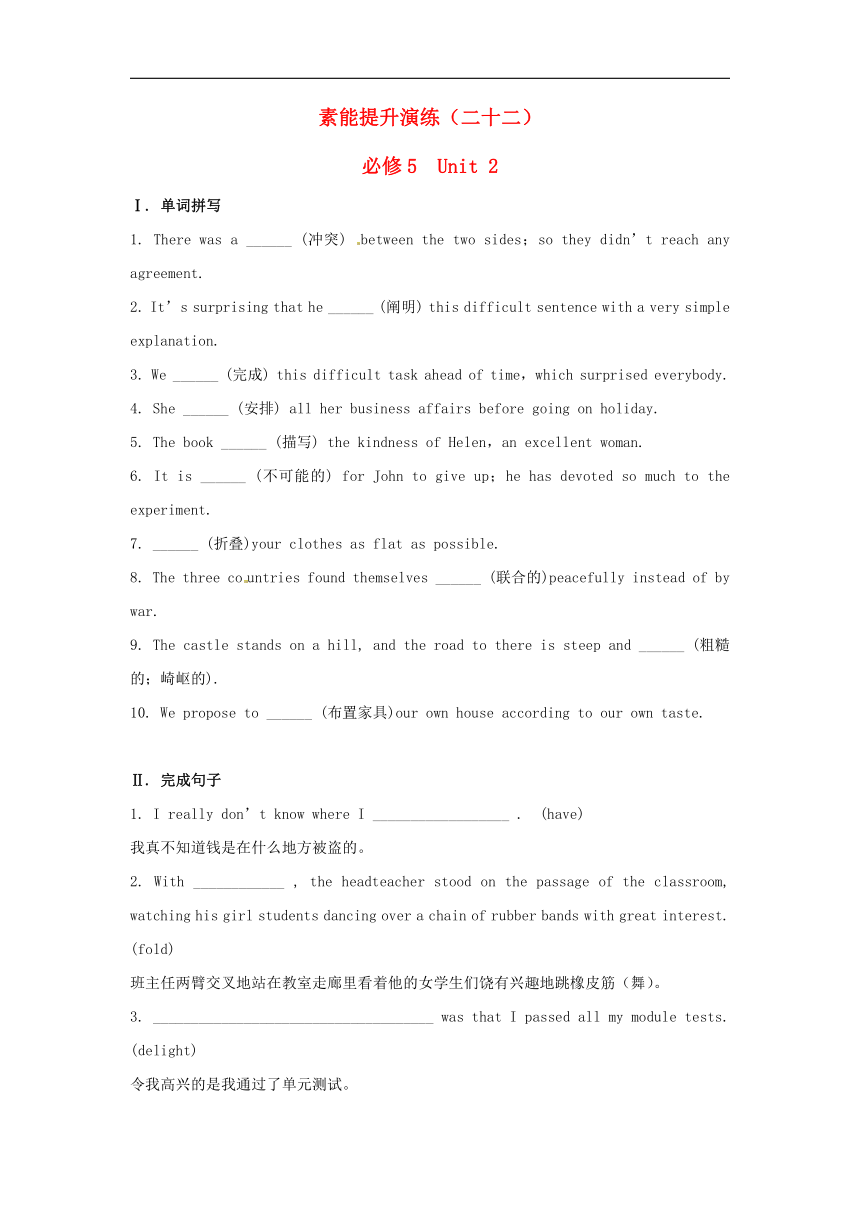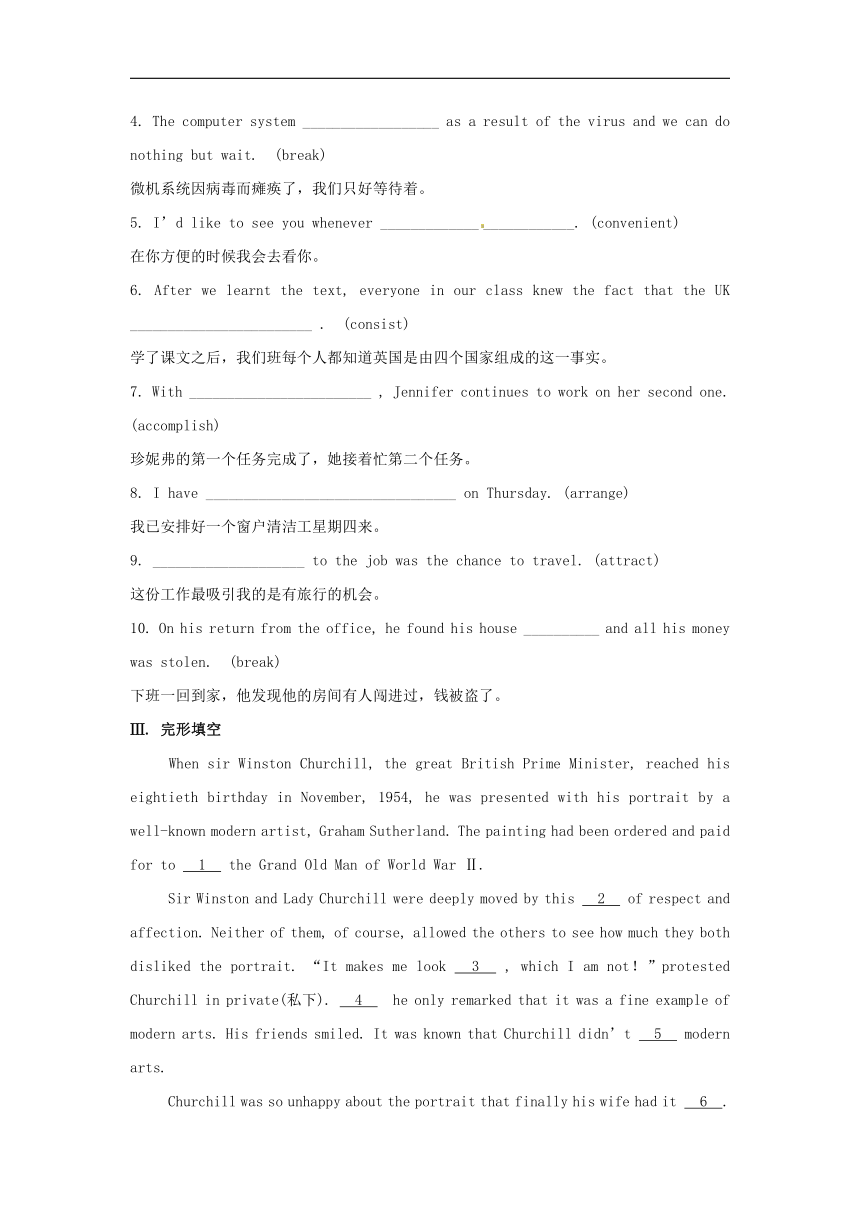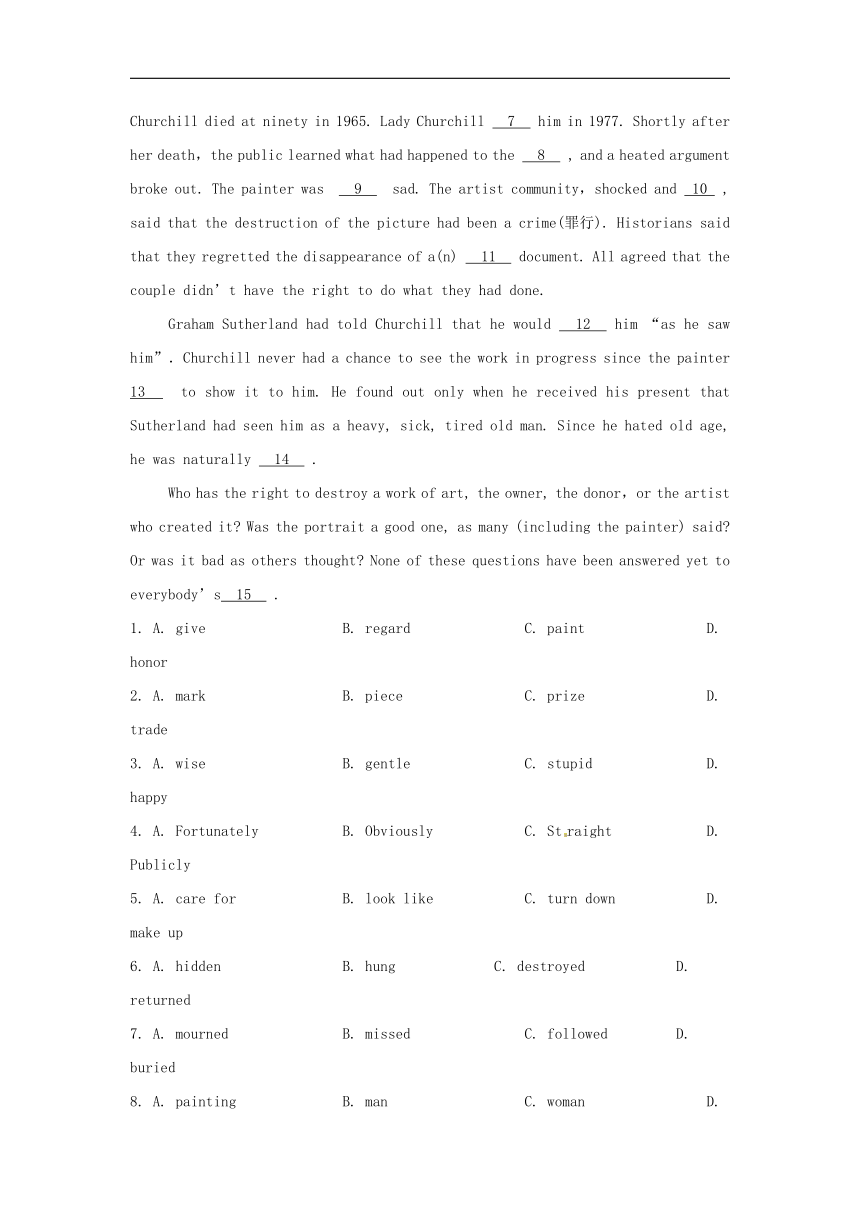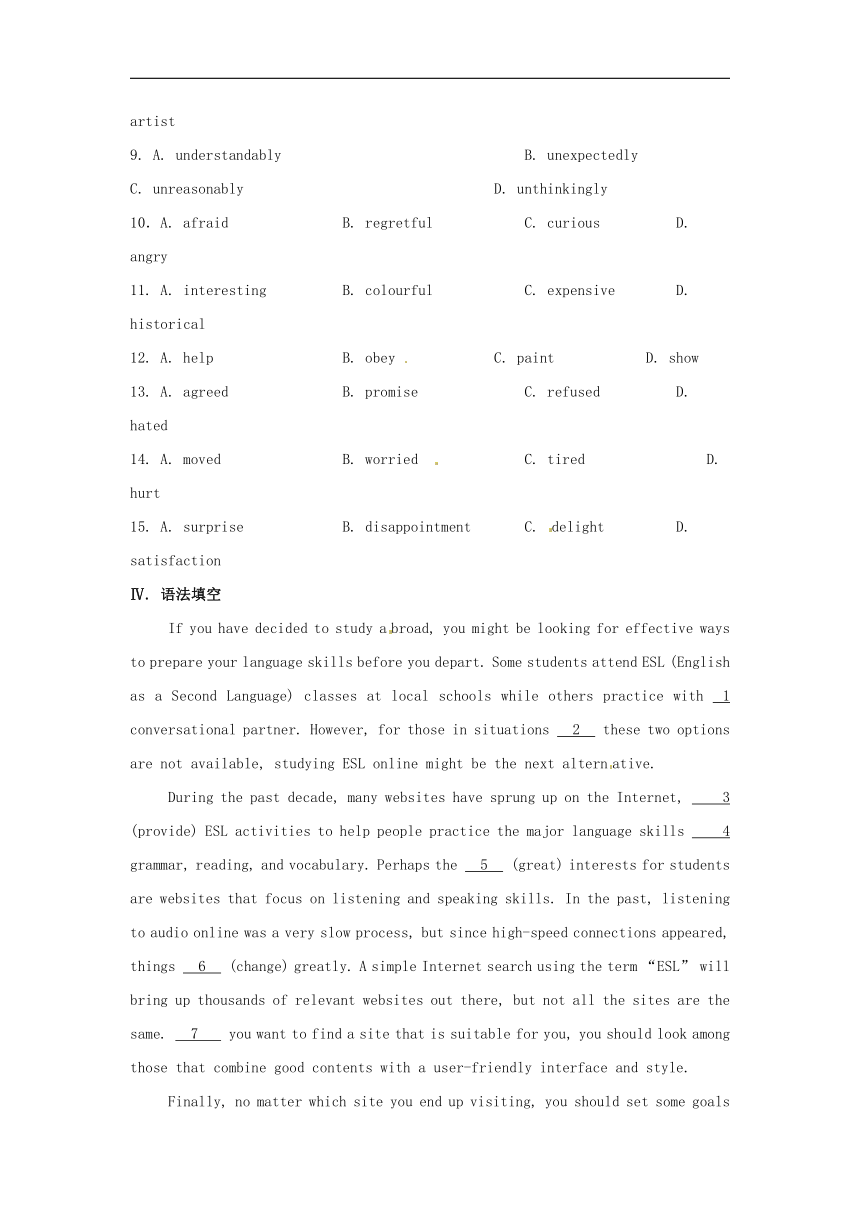人教版(新课程标准) 必修5 Unit 2 The United Kingdom 素能提升演练(二十二) (有答案解析)
文档属性
| 名称 | 人教版(新课程标准) 必修5 Unit 2 The United Kingdom 素能提升演练(二十二) (有答案解析) |

|
|
| 格式 | doc | ||
| 文件大小 | 68.3KB | ||
| 资源类型 | 教案 | ||
| 版本资源 | 人教版(新课程标准) | ||
| 科目 | 英语 | ||
| 更新时间 | 2023-01-31 00:00:00 | ||
图片预览




文档简介
素能提升演练(二十二)
必修5 Unit 2
Ⅰ. 单词拼写
1. There was a ______ (冲突) between the two sides;so they didn’t reach any agreement.
2. It’s surprising that he ______ (阐明) this difficult sentence with a very simple explanation.
3. We ______ (完成) this difficult task ahead of time,which surprised everybody.
4. She ______ (安排) all her business affairs before going on holiday.
5. The book ______ (描写) the kindness of Helen,an excellent woman.
6. It is ______ (不可能的) for John to give up;he has devoted so much to the experiment.
7. ______ (折叠)your clothes as flat as possible.
8. The three countries found themselves ______ (联合的)peacefully instead of by war.
9. The castle stands on a hill, and the road to there is steep and ______ (粗糙的;崎岖的).
10. We propose to ______ (布置家具)our own house according to our own taste.
Ⅱ. 完成句子
1. I really don’t know where I __________________ . (have)
我真不知道钱是在什么地方被盗的。
2. With ____________ , the headteacher stood on the passage of the classroom, watching his girl students dancing over a chain of rubber bands with great interest. (fold)
班主任两臂交叉地站在教室走廊里看着他的女学生们饶有兴趣地跳橡皮筋(舞)。
3. _____________________________________ was that I passed all my module tests. (delight)
令我高兴的是我通过了单元测试。
4. The computer system __________________ as a result of the virus and we can do nothing but wait. (break)
微机系统因病毒而瘫痪了,我们只好等待着。
5. I’d like to see you whenever _________________________. (convenient)
在你方便的时候我会去看你。
6. After we learnt the text, everyone in our class knew the fact that the UK ________________________ . (consist)
学了课文之后,我们班每个人都知道英国是由四个国家组成的这一事实。
7. With ________________________ , Jennifer continues to work on her second one. (accomplish)
珍妮弗的第一个任务完成了,她接着忙第二个任务。
8. I have _________________________________ on Thursday. (arrange)
我已安排好一个窗户清洁工星期四来。
9. ____________________ to the job was the chance to travel. (attract)
这份工作最吸引我的是有旅行的机会。
10. On his return from the office, he found his house __________ and all his money was stolen. (break)
下班一回到家,他发现他的房间有人闯进过,钱被盗了。
Ⅲ. 完形填空
When sir Winston Churchill, the great British Prime Minister, reached his eightieth birthday in November, 1954, he was presented with his portrait by a well-known modern artist, Graham Sutherland. The painting had been ordered and paid for to 1 the Grand Old Man of World War Ⅱ.
Sir Winston and Lady Churchill were deeply moved by this 2 of respect and affection. Neither of them, of course, allowed the others to see how much they both disliked the portrait. “It makes me look 3 , which I am not!”protested Churchill in private(私下). 4 he only remarked that it was a fine example of modern arts. His friends smiled. It was known that Churchill didn’t 5 modern arts.
Churchill was so unhappy about the portrait that finally his wife had it 6 . Churchill died at ninety in 1965. Lady Churchill 7 him in 1977. Shortly after her death,the public learned what had happened to the 8 , and a heated argument broke out. The painter was 9 sad. The artist community,shocked and 10 , said that the destruction of the picture had been a crime(罪行). Historians said that they regretted the disappearance of a(n) 11 document. All agreed that the couple didn’t have the right to do what they had done.
Graham Sutherland had told Churchill that he would 12 him “as he saw him”.Churchill never had a chance to see the work in progress since the painter 13 to show it to him. He found out only when he received his present that Sutherland had seen him as a heavy, sick, tired old man. Since he hated old age, he was naturally 14 .
Who has the right to destroy a work of art, the owner, the donor,or the artist who created it Was the portrait a good one, as many (including the painter) said Or was it bad as others thought None of these questions have been answered yet to everybody’s 15 .
1. A. give B. regard C. paint D. honor
2. A. mark B. piece C. prize D. trade
3. A. wise B. gentle C. stupid D. happy
4. A. Fortunately B. Obviously C. Straight D. Publicly
5. A. care for B. look like C. turn down D. make up
6. A. hidden B. hung C. destroyed D. returned
7. A. mourned B. missed C. followed D. buried
8. A. painting B. man C. woman D. artist
9. A. understandably B. unexpectedly
C. unreasonably D. unthinkingly
10.A. afraid B. regretful C. curious D. angry
11. A. interesting B. colourful C. expensive D. historical
12. A. help B. obey C. paint D. show
13. A. agreed B. promise C. refused D. hated
14. A. moved B. worried C. tired D. hurt
15. A. surprise B. disappointment C. delight D. satisfaction
Ⅳ. 语法填空
If you have decided to study abroad, you might be looking for effective ways to prepare your language skills before you depart. Some students attend ESL (English as a Second Language) classes at local schools while others practice with 1 conversational partner. However, for those in situations 2 these two options are not available, studying ESL online might be the next alternative.
During the past decade, many websites have sprung up on the Internet, 3 (provide) ESL activities to help people practice the major language skills 4 grammar, reading, and vocabulary. Perhaps the 5 (great) interests for students are websites that focus on listening and speaking skills. In the past, listening to audio online was a very slow process, but since high-speed connections appeared, things 6 (change) greatly. A simple Internet search using the term “ESL” will bring up thousands of relevant websites out there, but not all the sites are the same. 7 you want to find a site that is suitable for you, you should look among those that combine good contents with a user-friendly interface and style.
Finally, no matter which site you end up visiting, you should set some goals 8 your study. 9 might include the number of vocabulary you want to learn, specific grammar structures you want to review, 10 even how many minutes you want to read aloud from a newspaper in English.
Ⅴ. 阅读理解
[2012南昌模拟]
You’re rushing to work and a man ahead of you collapses on the sidewalk. Do you stop to help In a study of by-standers, it was found that some people avert their gaze and keep on walking rather than stop and get involved.
“There is a tendency to decide that no action is needed. ” says a psychologist. “The first thoughts that pop into your mind often keep you from offering help. In order to take action, you have to work against them. ” Here are some common thoughts that might prevent you from helping.
● Why should I be the one I’m probably not the most competent (有能力的) person in this crowd. You might think someone older or with more medical knowledge should offer assistance.
● What if he doesn’t really need my help The fear of embarrassment is powerful; no one wants to risk looking foolish in front of others.
● No one else looks concerned—this must not be a problem. We can follow the people around us, but most people tend to hold back their emotions in public.
“If you spot trouble and find yourself explaining inaction, force yourself to stop and evaluate the situation instead of walking on, ” says the psychologist. “Then retry to involve other people; you don’t have to take on the entire responsibility of being helpful. Sometimes it’s just a matter of turning to the person next to you and saying, it looks like we should do something. Or asking someone if an ambulance has been called and, if not, to call for one. Once you take action, most people will follow you. ”
1. Which is NOT the common thought that stops you from helping others
A. I’m not the very person capable of setting the problem.
B. It looks like we should do something.
C. It must not be a problem as no one else is concerned.
D. He doesn’t really need my help.
2. According to a study of by-standers, what will some people do when a man ahead falls down on the sidewalk
A. They will call for help and then walk away.
B. They will stop and offer help.
C. They will turn away their eyes and go on walking.
D. They will laugh at him.
3. We learn from the last paragraph that if we spot trouble, _______ .
A. we should call the ambulance as soon as we can
B. we should take on the whole responsibility and do something alone
C. we should stop and evaluate the situation and try to make other people follow
D. we should turn to other people and ask them to take on the responsibility
4. In order to offer others your timely help, you need to _______ .
A. ask others for help and call the police
B. get along well with the passers-by who spot the trouble
C. go directly to the police station
D. work against the first thoughts that prevent you from offering help
5. The main purpose of the text is to tell readers _______ .
A. to give others a hand
B. to be more competent
C. not to risk looking foolish
D. to stop and evaluate the situation
6. 请用30个左右的词概括文章大意
________________________________________________________________________________________________________________________________________
答案解析
Ⅰ. 1. conflict 2. clarified 3. accomplished 4. arranged
5. describes 6. impossible 7. Fold 8. united 9. rough 10. furnish
Ⅱ. 1. I had my money stolen
2. his arms folded
3. What delighted me/What made me delighted
4. has broken down
5. it is convenient to you
6. consists of four countries
7. her first task accomplished
8. arranged for the window cleaner to come
9. What attracted me most
10. broken into
Ⅲ. 1.【解析】选D。根据上文可知人们给他画像是为了向这位二战巨人表示敬意,give“送,给”,regard“认为,视为”,paint“画画”,honor “尊敬”。
2.【解析】选A。根据句意可知他们夫妇俩被这种敬意和感情感动了。trade 表示“交易”,此处用mark表示“标记”,与sign同一含义,如 a mark of esteem “表示敬意”。
3.【解析】选C 。根据上文可知他们不喜欢这幅画。四个选项中只有C才能构成让人不喜欢的原因,因此选stupid。
4.【解析】选D。根据上文的in private,相反的就是publicly,也就是:这种不满只是在私下说的,在公开场合还是赞美它。
5.【解析】选A。根据上文他只是说这幅画是现代艺术作品中优秀作品的一个好的代表,委婉表达了他的感受:他不喜欢现代艺术。
6.【解析】选C。根据上下文可知,他妻子把这幅画“毁了”而不是 “藏起来”或者“还回去”,所以后来引发了下文人们的议论。
7.【解析】选C。根据上下文可知:丘吉尔夫人十二年之后也随他仙逝,下文说她死后没多久。
8.【解析】选A 。根据上下文的语境可知:人们此时得知那幅画的归宿,它被毁了,由此引发了争论。
9.【解析】选A。根据上下文可知那个画家肯定会很伤心,四个选项中understandably“可以(被人)理解地”,unexpectedly“出乎意料地”,unreasonably“不合理地”,unthinkingly“轻率地”。
10.【解析】选D。根据上下文可知整个画界知道此事后很震惊也很愤怒,与shocked(震惊)一样的强烈情绪是angry。
11.【解析】选D。根据句意:历史学家很遗憾这份历史文献的消失,这句话是历史学家(Historians)说的,因此是考虑其作为“历史文献”的价值。
12.【解析】选C。根据上下文:这是这位画家说的话,他会真实地描述自己眼中的丘吉尔。
13.【解析】选C。根据下文可知:画家在画的过程中不让他看,也就是说直到画家完成后,他才有机会看到。
14.【解析】选D。根据上下文可知:他憎恨年迈,看见画中自己的模样,自然会觉得受到伤害。
15.【解析】选D。根据句意:对这些问题,还没有一个使每个人满意的回答。surprise“惊讶,惊奇”,disappointment“失望”,delight“高兴,快乐”,satisfaction“满意,满足”。
Ⅳ. 本文是事物说明文,说明了除上强化班和找人对练外,出国前学好英语的另一种选择,上在线ESL学习网站。
1. 【解析】a,名词短语缺少冠词,a conversational partner,对话的伙伴。
2. 【解析】where,前后都是主谓结构用连词,定语从句缺少关系副词,where在从句中作地点状语。
3. 【解析】providing,考查谓语或非谓语,现在分词表伴随情况。
4. 【解析】like,介词短语缺少介词,like grammar, reading, and vocabulary介词短语作定语,限定skills。
5. 【解析】greatest,形容词、副词考查比较等级,greatest是暗含比较范围的最高级。
6. 【解析】have changed,考查谓语或非谓语,since自从……以来,通常与现在完成时连用。
7. 【解析】If,前后都是主谓结构用连词,if引导条件状语从句。
8. 【解析】for,介词短语缺少介词,for your study是介词短语表目的。
9. 【解析】They,代词指代上文,they指代上文的goals。
10. 【解析】and,前后都是主谓结构用连词,and连接include的两个宾语从句。
Ⅴ. 1.【解析】选B。细节理解题。根据“I’m probably not the most competent person in this crowd.”判断A项是一种想法;根据“No one else looks concerned—this must not be a problem.”判断C项也是一种想法;根据“What if he doesn’t really need my help?”判断D项还是一种想法。故选B。
2. 【解析】选C。细节理解题。由第一段中的“. . . it was found that some people avert their gaze and keep on walking rather than stop and get involved.”可知C项正确。
3.【解析】选C。细节理解题。根据最后一段中心理学家说的话可知, 当我们遇到这种情况时, 我们应该停下来, 分析情况并尽量使其他人也这样做, 故答案为C。
4.【解析】选D。推理判断题。根据第二段中心理学家说的话可知, 要想帮助别人, 我们就需要打消自己最初的不帮助别人的想法。
5.【解析】选A。推理判断题。本文通过分析人们不去帮助急需救助的人的现象, 告诉人们应该如何应对这种问题, 以便能够及时帮助别人, 所以A项正确。
6. The passage talks about a social phenomenon. Many people refuse to help others who are in trouble. By analysing the reasons for it, the writer encourages people to give others a hand.
必修5 Unit 2
Ⅰ. 单词拼写
1. There was a ______ (冲突) between the two sides;so they didn’t reach any agreement.
2. It’s surprising that he ______ (阐明) this difficult sentence with a very simple explanation.
3. We ______ (完成) this difficult task ahead of time,which surprised everybody.
4. She ______ (安排) all her business affairs before going on holiday.
5. The book ______ (描写) the kindness of Helen,an excellent woman.
6. It is ______ (不可能的) for John to give up;he has devoted so much to the experiment.
7. ______ (折叠)your clothes as flat as possible.
8. The three countries found themselves ______ (联合的)peacefully instead of by war.
9. The castle stands on a hill, and the road to there is steep and ______ (粗糙的;崎岖的).
10. We propose to ______ (布置家具)our own house according to our own taste.
Ⅱ. 完成句子
1. I really don’t know where I __________________ . (have)
我真不知道钱是在什么地方被盗的。
2. With ____________ , the headteacher stood on the passage of the classroom, watching his girl students dancing over a chain of rubber bands with great interest. (fold)
班主任两臂交叉地站在教室走廊里看着他的女学生们饶有兴趣地跳橡皮筋(舞)。
3. _____________________________________ was that I passed all my module tests. (delight)
令我高兴的是我通过了单元测试。
4. The computer system __________________ as a result of the virus and we can do nothing but wait. (break)
微机系统因病毒而瘫痪了,我们只好等待着。
5. I’d like to see you whenever _________________________. (convenient)
在你方便的时候我会去看你。
6. After we learnt the text, everyone in our class knew the fact that the UK ________________________ . (consist)
学了课文之后,我们班每个人都知道英国是由四个国家组成的这一事实。
7. With ________________________ , Jennifer continues to work on her second one. (accomplish)
珍妮弗的第一个任务完成了,她接着忙第二个任务。
8. I have _________________________________ on Thursday. (arrange)
我已安排好一个窗户清洁工星期四来。
9. ____________________ to the job was the chance to travel. (attract)
这份工作最吸引我的是有旅行的机会。
10. On his return from the office, he found his house __________ and all his money was stolen. (break)
下班一回到家,他发现他的房间有人闯进过,钱被盗了。
Ⅲ. 完形填空
When sir Winston Churchill, the great British Prime Minister, reached his eightieth birthday in November, 1954, he was presented with his portrait by a well-known modern artist, Graham Sutherland. The painting had been ordered and paid for to 1 the Grand Old Man of World War Ⅱ.
Sir Winston and Lady Churchill were deeply moved by this 2 of respect and affection. Neither of them, of course, allowed the others to see how much they both disliked the portrait. “It makes me look 3 , which I am not!”protested Churchill in private(私下). 4 he only remarked that it was a fine example of modern arts. His friends smiled. It was known that Churchill didn’t 5 modern arts.
Churchill was so unhappy about the portrait that finally his wife had it 6 . Churchill died at ninety in 1965. Lady Churchill 7 him in 1977. Shortly after her death,the public learned what had happened to the 8 , and a heated argument broke out. The painter was 9 sad. The artist community,shocked and 10 , said that the destruction of the picture had been a crime(罪行). Historians said that they regretted the disappearance of a(n) 11 document. All agreed that the couple didn’t have the right to do what they had done.
Graham Sutherland had told Churchill that he would 12 him “as he saw him”.Churchill never had a chance to see the work in progress since the painter 13 to show it to him. He found out only when he received his present that Sutherland had seen him as a heavy, sick, tired old man. Since he hated old age, he was naturally 14 .
Who has the right to destroy a work of art, the owner, the donor,or the artist who created it Was the portrait a good one, as many (including the painter) said Or was it bad as others thought None of these questions have been answered yet to everybody’s 15 .
1. A. give B. regard C. paint D. honor
2. A. mark B. piece C. prize D. trade
3. A. wise B. gentle C. stupid D. happy
4. A. Fortunately B. Obviously C. Straight D. Publicly
5. A. care for B. look like C. turn down D. make up
6. A. hidden B. hung C. destroyed D. returned
7. A. mourned B. missed C. followed D. buried
8. A. painting B. man C. woman D. artist
9. A. understandably B. unexpectedly
C. unreasonably D. unthinkingly
10.A. afraid B. regretful C. curious D. angry
11. A. interesting B. colourful C. expensive D. historical
12. A. help B. obey C. paint D. show
13. A. agreed B. promise C. refused D. hated
14. A. moved B. worried C. tired D. hurt
15. A. surprise B. disappointment C. delight D. satisfaction
Ⅳ. 语法填空
If you have decided to study abroad, you might be looking for effective ways to prepare your language skills before you depart. Some students attend ESL (English as a Second Language) classes at local schools while others practice with 1 conversational partner. However, for those in situations 2 these two options are not available, studying ESL online might be the next alternative.
During the past decade, many websites have sprung up on the Internet, 3 (provide) ESL activities to help people practice the major language skills 4 grammar, reading, and vocabulary. Perhaps the 5 (great) interests for students are websites that focus on listening and speaking skills. In the past, listening to audio online was a very slow process, but since high-speed connections appeared, things 6 (change) greatly. A simple Internet search using the term “ESL” will bring up thousands of relevant websites out there, but not all the sites are the same. 7 you want to find a site that is suitable for you, you should look among those that combine good contents with a user-friendly interface and style.
Finally, no matter which site you end up visiting, you should set some goals 8 your study. 9 might include the number of vocabulary you want to learn, specific grammar structures you want to review, 10 even how many minutes you want to read aloud from a newspaper in English.
Ⅴ. 阅读理解
[2012南昌模拟]
You’re rushing to work and a man ahead of you collapses on the sidewalk. Do you stop to help In a study of by-standers, it was found that some people avert their gaze and keep on walking rather than stop and get involved.
“There is a tendency to decide that no action is needed. ” says a psychologist. “The first thoughts that pop into your mind often keep you from offering help. In order to take action, you have to work against them. ” Here are some common thoughts that might prevent you from helping.
● Why should I be the one I’m probably not the most competent (有能力的) person in this crowd. You might think someone older or with more medical knowledge should offer assistance.
● What if he doesn’t really need my help The fear of embarrassment is powerful; no one wants to risk looking foolish in front of others.
● No one else looks concerned—this must not be a problem. We can follow the people around us, but most people tend to hold back their emotions in public.
“If you spot trouble and find yourself explaining inaction, force yourself to stop and evaluate the situation instead of walking on, ” says the psychologist. “Then retry to involve other people; you don’t have to take on the entire responsibility of being helpful. Sometimes it’s just a matter of turning to the person next to you and saying, it looks like we should do something. Or asking someone if an ambulance has been called and, if not, to call for one. Once you take action, most people will follow you. ”
1. Which is NOT the common thought that stops you from helping others
A. I’m not the very person capable of setting the problem.
B. It looks like we should do something.
C. It must not be a problem as no one else is concerned.
D. He doesn’t really need my help.
2. According to a study of by-standers, what will some people do when a man ahead falls down on the sidewalk
A. They will call for help and then walk away.
B. They will stop and offer help.
C. They will turn away their eyes and go on walking.
D. They will laugh at him.
3. We learn from the last paragraph that if we spot trouble, _______ .
A. we should call the ambulance as soon as we can
B. we should take on the whole responsibility and do something alone
C. we should stop and evaluate the situation and try to make other people follow
D. we should turn to other people and ask them to take on the responsibility
4. In order to offer others your timely help, you need to _______ .
A. ask others for help and call the police
B. get along well with the passers-by who spot the trouble
C. go directly to the police station
D. work against the first thoughts that prevent you from offering help
5. The main purpose of the text is to tell readers _______ .
A. to give others a hand
B. to be more competent
C. not to risk looking foolish
D. to stop and evaluate the situation
6. 请用30个左右的词概括文章大意
________________________________________________________________________________________________________________________________________
答案解析
Ⅰ. 1. conflict 2. clarified 3. accomplished 4. arranged
5. describes 6. impossible 7. Fold 8. united 9. rough 10. furnish
Ⅱ. 1. I had my money stolen
2. his arms folded
3. What delighted me/What made me delighted
4. has broken down
5. it is convenient to you
6. consists of four countries
7. her first task accomplished
8. arranged for the window cleaner to come
9. What attracted me most
10. broken into
Ⅲ. 1.【解析】选D。根据上文可知人们给他画像是为了向这位二战巨人表示敬意,give“送,给”,regard“认为,视为”,paint“画画”,honor “尊敬”。
2.【解析】选A。根据句意可知他们夫妇俩被这种敬意和感情感动了。trade 表示“交易”,此处用mark表示“标记”,与sign同一含义,如 a mark of esteem “表示敬意”。
3.【解析】选C 。根据上文可知他们不喜欢这幅画。四个选项中只有C才能构成让人不喜欢的原因,因此选stupid。
4.【解析】选D。根据上文的in private,相反的就是publicly,也就是:这种不满只是在私下说的,在公开场合还是赞美它。
5.【解析】选A。根据上文他只是说这幅画是现代艺术作品中优秀作品的一个好的代表,委婉表达了他的感受:他不喜欢现代艺术。
6.【解析】选C。根据上下文可知,他妻子把这幅画“毁了”而不是 “藏起来”或者“还回去”,所以后来引发了下文人们的议论。
7.【解析】选C。根据上下文可知:丘吉尔夫人十二年之后也随他仙逝,下文说她死后没多久。
8.【解析】选A 。根据上下文的语境可知:人们此时得知那幅画的归宿,它被毁了,由此引发了争论。
9.【解析】选A。根据上下文可知那个画家肯定会很伤心,四个选项中understandably“可以(被人)理解地”,unexpectedly“出乎意料地”,unreasonably“不合理地”,unthinkingly“轻率地”。
10.【解析】选D。根据上下文可知整个画界知道此事后很震惊也很愤怒,与shocked(震惊)一样的强烈情绪是angry。
11.【解析】选D。根据句意:历史学家很遗憾这份历史文献的消失,这句话是历史学家(Historians)说的,因此是考虑其作为“历史文献”的价值。
12.【解析】选C。根据上下文:这是这位画家说的话,他会真实地描述自己眼中的丘吉尔。
13.【解析】选C。根据下文可知:画家在画的过程中不让他看,也就是说直到画家完成后,他才有机会看到。
14.【解析】选D。根据上下文可知:他憎恨年迈,看见画中自己的模样,自然会觉得受到伤害。
15.【解析】选D。根据句意:对这些问题,还没有一个使每个人满意的回答。surprise“惊讶,惊奇”,disappointment“失望”,delight“高兴,快乐”,satisfaction“满意,满足”。
Ⅳ. 本文是事物说明文,说明了除上强化班和找人对练外,出国前学好英语的另一种选择,上在线ESL学习网站。
1. 【解析】a,名词短语缺少冠词,a conversational partner,对话的伙伴。
2. 【解析】where,前后都是主谓结构用连词,定语从句缺少关系副词,where在从句中作地点状语。
3. 【解析】providing,考查谓语或非谓语,现在分词表伴随情况。
4. 【解析】like,介词短语缺少介词,like grammar, reading, and vocabulary介词短语作定语,限定skills。
5. 【解析】greatest,形容词、副词考查比较等级,greatest是暗含比较范围的最高级。
6. 【解析】have changed,考查谓语或非谓语,since自从……以来,通常与现在完成时连用。
7. 【解析】If,前后都是主谓结构用连词,if引导条件状语从句。
8. 【解析】for,介词短语缺少介词,for your study是介词短语表目的。
9. 【解析】They,代词指代上文,they指代上文的goals。
10. 【解析】and,前后都是主谓结构用连词,and连接include的两个宾语从句。
Ⅴ. 1.【解析】选B。细节理解题。根据“I’m probably not the most competent person in this crowd.”判断A项是一种想法;根据“No one else looks concerned—this must not be a problem.”判断C项也是一种想法;根据“What if he doesn’t really need my help?”判断D项还是一种想法。故选B。
2. 【解析】选C。细节理解题。由第一段中的“. . . it was found that some people avert their gaze and keep on walking rather than stop and get involved.”可知C项正确。
3.【解析】选C。细节理解题。根据最后一段中心理学家说的话可知, 当我们遇到这种情况时, 我们应该停下来, 分析情况并尽量使其他人也这样做, 故答案为C。
4.【解析】选D。推理判断题。根据第二段中心理学家说的话可知, 要想帮助别人, 我们就需要打消自己最初的不帮助别人的想法。
5.【解析】选A。推理判断题。本文通过分析人们不去帮助急需救助的人的现象, 告诉人们应该如何应对这种问题, 以便能够及时帮助别人, 所以A项正确。
6. The passage talks about a social phenomenon. Many people refuse to help others who are in trouble. By analysing the reasons for it, the writer encourages people to give others a hand.
